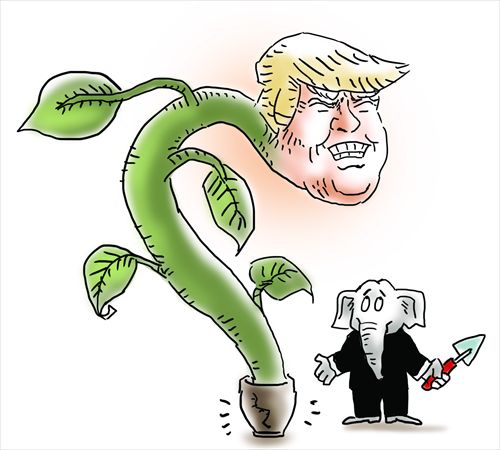Voters’ paranoia creates Trump frenzy

Illustration: Shen Lan /GT
The surprising rise of real estate billionaire and TV celebrity Donald Trump has projected a crude, vulgar and willfully ignorant face of US politics to the world. Even many Americans are puzzled by the appeal of Trump, who has been denounced as a "phony" and a "fraud" by the two previous Republican presidential nominees Mitt Romney and John McCain.
How to explain it? Trump's success reflects several factors. First, the Republican Party has, in effect, created this monster.
For the past 15 years or so, they have moved from the traditional Republican stance of favoring limited government to being anti-government: they have shut down and derided government. Though the basic "checks and balances" of the US constitution are based on compromise, Tea Party Republicans in the Congress view deal-making as "betrayal." This is anti-politics, resulting in less legislation being passed than any Congress in the past 100 years.
Republicans played to people's fears, bashing "illegal immigration" and racist tendencies, demonizing Barack Obama, the first black US president, though he has governed as a fairly typical liberal Democrat. They portrayed him as a Muslim alien from Kenya, a crypto-communist, and an existential threat to the US. In addition, recent legal decisions have allowed large amounts of anonymous money into politics.
Meanwhile, Obama's efforts to wind down US wars in Afghanistan and Iraq and his reluctance to get involved in Syria is perceived as weakness.
Since Democrats have controlled the White House for the past 8 years, Republicans promised results to their supporters that they could not deliver, as they mainly reject working with Obama. This failure has angered many Republican voters who view Trump as an outsider for change.
More broadly, Trump's rise reflects two large social trends. One is growing income inequality resulting largely from globalization and technological change. Middle-class wages have stagnated despite economic growth and 4.9 percent unemployment. Many less educated workers have trouble finding jobs.
The other trend is demographic: the US is becoming less white and more Latino, black, and Asian. This tends to bring out the worst tendencies of white Americans, such as growing xenophobia and blame being heaped on immigrants.
Trump promises a wall along the Mexican border even though in fact, for the past five years, there has been a negative net flow of Mexicans out of the US. But facts don't seem to matter in the face of anger and fear at cultural change.
Trump plays on fears. He claims to be for free trade but opposes every trade deal the US has made because no one as "smart" as him negotiated them. Trump confuses globalization and the economics of supply chains with unfair trade, blaming China, Japan and Mexico because the US has trade deficits with them. This defies basic economics.
Trump is also a talented showman, as demonstrated from his popular TV appearances that have given him a celebrity status. This is part of his appeal as a xenophobic nationalist.
Richard J. Hofstadter, a famous historian, wrote an influential essay in 1967 called "The Paranoid Style in American Politics." Trump reflects this tendency in the US system. We are in a time of slow economic growth and growing income inequality, of uncertainty, growing racial diversity, and a global diffusion of power changing the US role. All this makes many Americans anxious and increases the appeal of an emotional, often fact-free populism.
In this historic moment of transition, Trump's slogan is "Make America Great Again." He is nostalgia for a mythical 1950s when the US was the world's dominant economy, prosperity for mainly white factory and office collar workers boomed and US military power dominated the globe. Trump has no time machine. You can't undo globalization or demographics. But it is an enticing fantasy.
Overlooked are Trump's many failed casinos, bankruptcies and other failed business ventures, suggesting as Romney said "he is no business genius." His wealth is largely inherited from his father.
What does all this say about the US future? Perhaps less than many think. The Trump phenomenon shattered US political norms and caused panic in the Republican Party. But the 24-hour cable news cycle has inflated its proportions.
The world should remember that only about 15 percent of the US electorate votes in Republican primary elections to choose the party's nominee. Of that, Trump has consistently received only about one-third of the vote, which is roughly 4-5 percent of the total US electorate. A recent NBC/Wall Street Journal poll found that 64 percent of registered US voters had a negative view of Trump. How Trump fares in the general election may be a very different story from the Republican primaries. Sanity may yet prevail.
The author is a Senior Fellow of the Brent Scowcroft Center for International Security at the Atlantic Council. opinion@globaltimes.com.cn. Follow him on Twitter @RManning4.